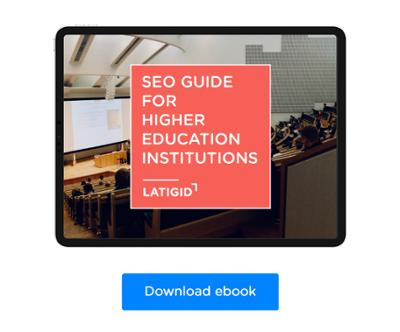
As we step into 2024, higher education digital marketing has become an indispensable tool to reach prospective students, engage with their current ones, and stay competitive in a rapidly changing environment. In this blog article, we will explore the top digital marketing strategies that are set to dominate the higher education sector in 2024.
The importance of digital marketing in higher education

Digital marketing plays a crucial role in the higher education sector, offering numerous benefits for educational institutions. Here are some key reasons why digital marketing is important in higher education:
Increases visibility and reach
Digital marketing enables institutions to reach a global audience. Through various online channels such as social media, search engines, and email, universities can target prospective students locally and internationally.
Allows institutions to create highly targeted campaigns
Digital marketing allows institutions to create highly targeted campaigns. By analyzing data and user behavior, universities can tailor their messages to specific demographics, interests, and behaviors, ensuring that their marketing efforts are more effective.More cost-effective than traditional marketing
Digital marketing is often more cost-effective than traditional marketing methods. Online advertising, social media marketing, and email campaigns can reach a large audience at a fraction of the cost of traditional advertising channels.More engagement and interaction
Social media platforms provide a space for universities to engage with their audience in real-time. This interaction helps build a sense of community and allows institutions to address inquiries, showcase campus life, and share relevant content.Institutions can track and measure the performance
Digital marketing platforms offer robust analytics tools. Institutions can track and measure the performance of their campaigns, gaining insights into user behavior, demographics, and engagement. This data-driven approach allows for continuous improvement and optimization of marketing strategies.Universities can personalize their communication
Through digital channels, universities can personalize their communication with prospective students. Tailoring messages to individual interests and needs can enhance the effectiveness of recruitment efforts.Streamlines the recruitment and admissions process
Digital marketing streamlines the recruitment and admissions process. Institutions can use targeted online campaigns to attract applications, provide information about courses, scholarships, and campus life, and guide prospective students through the application process.Impact of digital marketing on higher education

The impact of digital marketing on higher education has been significant, transforming the way institutions attract, engage, and enroll students. Here are some key aspects of the impact of digital marketing on higher education:
Increases enrollment
Effective digital marketing can lead to a significant increase in enrollments. When prospective students find an institution online and are impressed by the content and interactions they encounter, they are more likely to apply and enroll.
Improves reputation
A strong online presence helps institutions establish and enhance their reputation. Positive reviews, engaging content, and active social media profiles all contribute to a favorable perception among prospective students and their families.
Better student engagement
Institutions that use digital marketing to engage with students throughout the enrollment process tend to see improved student engagement and retention rates. Personalized communication and informative content can help students make more informed decisions about their education.
Facilitates global recruitment and diversity
Digital marketing has facilitated global recruitment efforts. Universities can attract students from different parts of the world, promoting diversity and enriching the student body. Online platforms help institutions showcase their international programs and create a global appeal.
Related article: 5 Digital Marketing Tips for Universities
Top higher education digital marketing strategies for 2024
Video content dominance
Video marketing has been on the rise for years, and in 2024, it's expected to dominate the higher education sector. Institutions should invest in creating high-quality video content, including virtual campus tours, student testimonials, and instructional videos. Live streaming of events, lectures, and Q&A sessions can also foster real-time engagement with prospective students. Short-form videos on platforms like TikTok and Instagram Reels should not be overlooked, as they can effectively capture the attention of younger audiences.
Personalized email campaigns
Email marketing remains a powerful tool for higher education institutions. In 2024, the key will be personalization. Tailor your email campaigns to individual interests and behaviors. Utilize automation tools to send relevant content, such as program updates, scholarship opportunities, or event invitations. Implement segmentation to ensure that each prospect receives content tailored to their stage in the admissions process, whether they are just starting to research or ready to apply.
Chatbots and AI-powered assistants
Chatbots and AI-powered assistants are becoming indispensable for providing immediate responses to prospective students' inquiries. These tools can guide visitors through the admissions process, answer frequently asked questions, and even help schedule campus visits. The use of AI also allows institutions to gather valuable data on user behavior and preferences, which can inform marketing strategies and improve the overall user experience.
Search engine optimization (SEO)
In 2024, SEO will continue to be a fundamental aspect of digital marketing for higher education. Institutions must ensure that their websites are optimized for search engines to appear prominently in relevant search results. This includes creating high-quality, informative content that addresses common queries, optimizing website speed and mobile-friendliness, and utilizing local SEO tactics for campus-based programs.
Influencer partnerships
Collaborating with student influencers and alumni who have a strong online presence can be a game-changer for higher education institutions. These influencers can share their authentic experiences and stories, attracting a wider audience of potential applicants. Partnering with influencers also allows institutions to tap into the trust and credibility these individuals have already established with their followers.
Virtual reality (VR) and augmented reality (AR)
Virtual campus tours have gained popularity due to travel restrictions and the convenience they offer. However, in 2024, institutions should consider taking this a step further by exploring VR and AR experiences. These immersive technologies can provide prospective students with a realistic sense of campus life and learning environments. Incorporating VR and AR into your digital marketing efforts can set your institution apart from the competition.
As we look ahead to 2024, higher education institutions must recognize the evolving digital landscape and adapt their marketing strategies accordingly. Embracing video content, personalization, AI-powered tools, SEO, influencer partnerships, immersive technologies, and data-driven decision-making will be crucial for success. By staying ahead of the digital marketing curve, institutions can effectively engage with prospective students, enhance their online presence, and continue to thrive in the competitive world of higher education.
Related article: Targeting Gen Z: Digital Marketing Trends for Higher Education
About LATIGID
We are a higher education marketing sgency. We help you grow by increasing website traffic, generating more student leads, and closing those leads into enrollment. With a deep understanding of the latest industry trends and best practices, we are well equipped to help your institution grow.
If you are looking for a higher education marketing agency to partner with, check our page to see what we can do for you!
Download our SEO guide and learn how to build a strategy to optimize your Higher Education Institution's website





